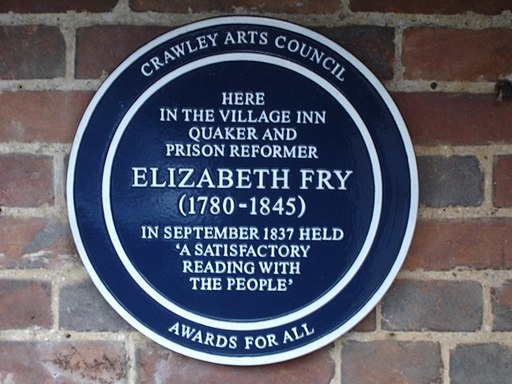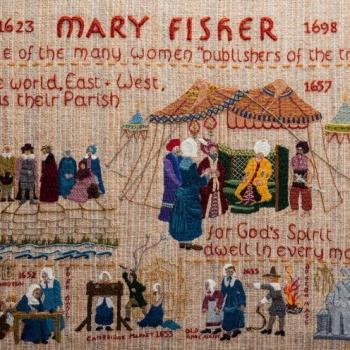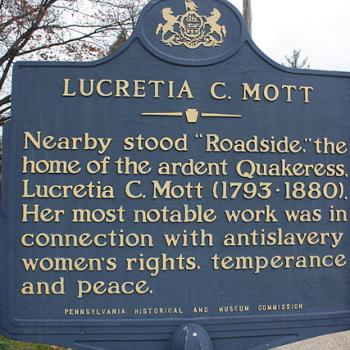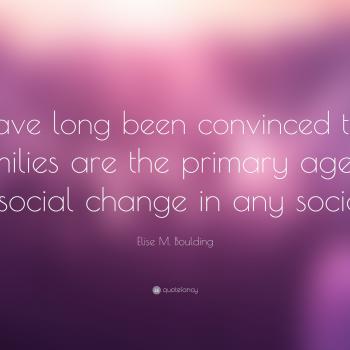
Wikimedia Commons
Elizabeth Gurney Fry acted on her beliefs. She was born in 1780 in Norwich, England into a prosperous and prominent Quaker family, the Gurneys. Her mother was part of the Barclay family of Barkley bank fame, and her father was a partner in the Gurney bank as well as a factory owner. Mrs. Gurney modeled concern for the community with her own charity work. She also required the children spend time daily in silence worship – 2 hours a day.
So it is not surprising that Elizabeth was a serious young woman, interested in working with the poor. She showed interest in political movements such as universal suffrage. After meeting an American Quaker, William Savery, who had preached in Norwich, she began projects to help the poor. She collected clothes for those in need and started a school in her house to teach local children to read. She was appointed to the committee that ran Ackworth School, a Quaker school.
Elizabeth married Joseph Fry in 1800 and by 1812 had born eight children. Her commitment to Quakerism grew, and she was approved as a preacher in 1811.
Prison Work Begins
Fry is known for her prison work which began after she learn of the conditions at Newgate Prison from a friend, Stephen Grellet in 1813. The state of the women and their children was appalling; they were cold, starving and without enough clothes. The women were all together no matter the seriousness of their crimes, their age or anything else. These conditions instigated in Fry a lifelong commitment to prison reform.
She established a school and a chapel in Newgate. She saw that the women learned to sew and gain other talents that could earn them a living. Ever a Christian reformer, Bible classes and chapel services were part of her plan for bettering these women’s lives.
Her brother-in-law, Thomas Buxton, became a member of parliament in 1818 and had the means to promote Fry’s ideas. In one speech, he pointed out that England had more people in prison than all the other kingdoms in Europe combined. Fry was called to give evidence to a committee of the House of Commons, quite unusual for a woman at the time.
Renown and Successes in Prison Work
Fry had three more children after her prison work began and managed to balance her roles as wife, mother and reformer. By the 1820’s, she was well enough know to be attacked in the press for taking so active a role in public affairs, especially when men sought her professional knowledge. She was accused of neglecting her home and family.
The 1823 Gaols Act was passed by parliament and allowed for visits from chaplains, women warders in women’s prisons, and paid jailers instead of jailers exacting fees for privileges from prisoners. These reforms at first did not apply to debtors prisons or local town jails. Fry and her brother-in-law visited these other prisons and wrote a book about the conditions.
Fry’s work and ideas impressed many in government, but they balked when she declared that capital punishment was evil. At the time, there were 200 capital offenses on the books in England, including forgery. Fry worked diligently on behalf of women sentenced to hang. In her testimony to the House of Lords, May 22, 1835, she said:
I feel it to be the bounden duty of the Government and the country that those truths [in the Bible] should be administered in the manner most likely to conduce to the real reformation of the prisoners for though severe punishment may, in a measure, deter them and others from crime, it does not amend and change the heart.
Beyond Prisons
When on vacation in Brighton in 1824, Fry was surprised by the number of beggars and at the poverty of the town. She established teams of voluntary visitors to go to the homes of the poor to provide assistance and comfort. The Brighton Visiting Society’s success lead to District Visiting Societies all over England.
Joseph Fry went bankrupt in 1828, damaging Elizabeth’s name and the reputation of the charities she was involved in. Her brother, Joseph, took over Joseph Fry’s affairs, sorted out the debts and provided Elizabeth with sufficient funds to continue her work.
Fry advocated for the homeless of London and worked to improve conditions for patients in asylums. She also focused on the conditions is workhouses and hospitals. The latter led her to become involved in nursing. In 1840, Fry started a nurses training school. Her trainees attended to the physical and spiritual needs of their patients. Florence Nightingale was so influenced by Fry’s training that she took a some of Fry’s nurses to tend the wounded in the Crimean War.
Quite a career for one woman in the 1800s. Fry died in 1845 after a brief illness. It is said that over one thousand people were at the graveyard in Barking when she was buried, standing in silence.
John Simkin, http://spartacus-educational.com/REfry.htm, provided much information for this article. I am in his debt.












